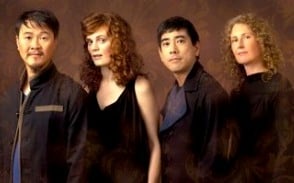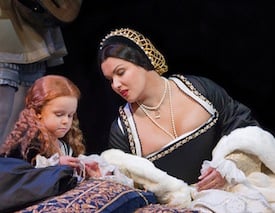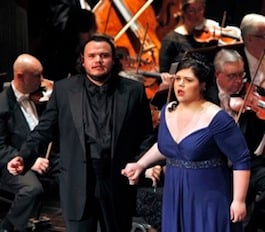Chamber Music Day — Live + Free
Mark Oct. 16 on your calendar. From 10 a.m. to 5:30 p.m., the de Young Museum will host a (mostly) free day of chamber music, performed by 33 ensembles, from the Alexander String Quartet to Voice of Music.
Performances in Wilsey Court and the Koret Auditorium don’t even require museum admission — a large portion of the de Young is always free of charge, including Wilsey Court, the tower observation platform (don’t miss!), the cafe, and the large sculpture garden.
Performances taking place in the permanent collection galleries do require general admission ($7 to $11) to the museum. For special exhibits, such as the current Picasso: Masterpieces From the Musée National Picasso, Paris, admission prices are $15 (under 17), $21 (students), $22 (seniors), and $25 (general) — but that’s independent from the chamber music day ... though the museum may not mind extra attendance. After you listen to Cage, you may have a hankering for Picasso.
The event is sponsored by the museum and San Francisco Friends of Chamber Music, and it’s curated by Renee Baldocchi, Katherine Bukstein, Kevin Chen, and Adam Fong.
Some of the performing ensembles — a mix of classical and “other” — on Oct. 16: Classical Revolution, Del Sol String Quartet, Delphi Trio, Hallifax & Jeffrey, Marcus Shelby Trio, martha & monica, Quartet San Francisco, Quinteto Latino, Rob Reich Trio, Thingamajigs
Flicka at Bread & Roses Benefit
There may well be benefits without Frederica von Stade, but it’s not easy to find one, especially in this nook of the woods. Now it’s time for Flicka to make her debut with Bread & Roses — a nonprofit in Marin that takes music into senior centers, prisons, drug rehabs, and homeless shelters, for free.Supported by Gordon Getty and other philanthropists, the organization will have a fund-raising concert, featuring Flicka and Jeremy Cohen’s Violinjazz, at 2 p.m., Sunday, Oct. 23, followed at 4 p.m. by a VIP reception. The venue is Coventry Grove, a private amphitheater in the garden of a Kensington home. General admission is $100, and VIP access to the post-show reception is $175. Space is limited to 200 guests.
For information and reservation, see the www.breadandroses.org Web site, call (451) 945-7120, or e-mail [email protected].
Classical Indian Dance to Herbst
In a happy coincidence, shortly after the Oct. 21 opening of Maharaja: The Splendor of India’s Royal Courts in the Asian Art Museum, San Francisco Performances is presenting the return of Shantala Shivalingappa to Herbst Theatre on Nov. 1.
The Madras-born dancer who grew up in Paris has mastered Southern India’s Kuchipudi and collaborated with such giants of Western ballet, theater, and modern dance as Maurice Béjart, Peter Brook (for whom she played Miranda in The Tempest and Ophelia in Hamlet), and Pina Bausch.
Accompanied by musicians from India, Shivalingappa performs a program called Swayambhu. When she appeared at the Jacob’s Pillow Dance Festival, her performances were greeted by standing ovations. Commented the New York Times: “Not all standing ovations are created equal ... [here] the audience surged to its feet as one, radiating a grateful joy. These are the real deal, distinguished by a humble acknowledgment in the face of art, and they don’t happen all that often.”
Shivalingappa describes Swayambhu:
In sanskrit, this term refers to a stone or rock whose shape naturally resembles the features of deities, such as Ganesha, the elephant-headed God, or Shiva the Lord of Dance.On a more subtle note, swayambhu is the spontaneous and sudden experience of an altered sense of reality. A moment of absolute lucidity, where Reality reveals its true nature: an infinite field of Unity, Fluidity, Energy.
The dancer becomes an artisan-alchemist. She opens up her tool-kit, each element finely sharpened, weighed, admired, and then handled with infinite care, gentleness, love. She seeks the right combination of materials, which will give rise to a pure expression.
Anna (Netrebko) Bolena Live in HD

The talk is about Anna Netrebko singing the title role of Donizetti’s Anna Bolena, but there’s more to this new Metropolitan Opera production.
It’s the Met premiere of a bel canto masterpiece, which has been a showpiece for great singers in history. The opera, based on the final tragic days of Anne Boleyn, is in a new production by David McVicar. Russian mezzo-soprano Ekaterina Gubanova sings the role of Giovanna Seymour, Bolena’s lady-in-waiting and romantic rival; Russian bass Ildar Abdrazakov is the cruel King Enrico (Henry) VIII; and Stephen Costello and Tamara Mumford are the queen’s allies, Lord Percy and Smeaton. Marco Armiliato conducts.
Transmitted live to local theaters at 10 a.m. Pacific time on Saturday, Oct. 15, the HD telecast will be hosted by Renée Fleming.
The list of California theaters doesn’t have anything in San Francisco, but that’s likely to be an error. If you find local screenings, please use Comments below to give the information.
End of the Road for Denver Symphony?
Sure, there is bad news about the fiscal situation of orchestras everywhere, but in Denver, it seems more serious than others.“Confusion, concern and even fear have swirled through Denver’s cultural community in the three weeks since the Denver Post reported the existence of an internal report detailing the Colorado Symphony’s precarious financial situation,” writes Kyle MacMillan in the Post:
Simply put, the CSO as we know it could be on the verge of collapse. While the orchestra has negotiated emergency salary concessions from its musicians amounting to a 9 percent pay cut this season, it has yet to clearly detail a financial plan for weathering its current fiscal year, let alone the long term. ...What Denver is looking for from its orchestra at this critical juncture is leadership — a bold, well-articulated vision for its future. And, frankly, we’re not getting it.
Instead, 20 members of the orchestra’s board of trustees resigned in the days leading up to a board meeting on Sept. 23 — just walked away from their responsibilities, stirring even more doubts about the organization’s viability.
There is a real danger, as made clear by the symphony’s internal report, that it could fold in two years or sooner unless radical financial reforms are instituted.
But an equally worrisome prospect is that the orchestra will be gutted. It seems more and more probable that the ensemble will become what is known in the field as a “per-service” orchestra — one where the musicians no longer have full-time jobs but are paid on a contract basis for the number of performances or rehearsals they play.
S.F. Performances' 'First Weeks in October'
What the first Monday in October is for the Supreme Court, the days following it are for San Francisco Performances: time for action.Officially opening the 32nd season on Oct. 13 is a recital by mezzo-soprano Stephanie Blythe in Herbst Theatre, accompanied by Warren Jones.

Blythe will perform an unusual program of lieder and Tin Pan Alley songs. The latter, taking up the second half of the evening, includes songs by Scott Joplin, Victor Herbert, and Irving Berlin. Art songs in the first half of the program sung by the singer known as a champion of contemporary American works are James Legg’s Twelve Poems of Emily Dickinson and Samuel Barber’s Three Songs, Op. 10.
Even before then, however, on Oct. 5, the Adam Shulman Trio opens the Rex Hotel series. Shulman on piano, Jack Riordan on guitar; and John Wiitala on bass, will pay tribute to jazz pianist and innovator Nat King Cole, performing from the repertoire of Cole’s Trio (formed in 1937, with guitarist Oscar Moore and bassist Wesley Prince).
During its October-to-May run, San Francisco Performances will offer dozens of piano, vocal, and guitar recitals, as well as chamber music, dance concerts, and jazz.
After three decades of making Herbst Theatre its home, S.F. Performances is beginning to use a variety of venues increasingly, in preparation for the closure of Herbst for the War Memorial seismic retrofit in 2013–2014. Dance companies continue to perform in Yerba Buena Center for the Arts’ Novellus Theater.
In contrast with S.F. Performances’ low pricing, its gala on Oct. 14 will be — understandably — a high-priced spread, meant to raise funds for the entire season. It’s “$400 and up.” Star of the event will be former Merolina/Adler Fellow Leah Crocetto, accompanied by Tamara Sanikidze, now a singing star hereabouts: She was the U.S. representative at the Cardiff Singer of the World competition.
As if that was not enough, the Crocetto-Sanikidze duo continues the performance on Oct.19 in a Hotel Rex recital. Ticket prices are coming down, all the way to $20.
Zákulisí Koncertu San Francisco
Our friend in Brno, former San Francisco Symphony Chorus member Charlie Cockey, says that headline translates to “Backstage at a concert of San Francisco,” but what’s funny is to watch Michael Tilson Thomas and Brent Asink speak fluent Czech (or is it a voiceover?) during the San Francisco Symphony’s visit to the Prague Spring during the orchestra’s European tour this year.At about seven minutes into the video, Laura Claycomb talks and then sings. Back comes MTT with something enthusiastic, again in Czech. And so it goes.
Domingo vs. Midgette and V.V.
Plácido Domingo and Washington Post writer Ann Midgette have been feudin’ and it all came to a boil last weekend when Domingo wrote a letter to the editor, including a paragraph that sounds rather lawyerly:Midgette’s statement that my conducting actually ‘sabotaged’ WNO’s recent performances of Puccini’s Tosca is offensive and defamatory [‘A serviceable “Tosca” signals business as usual’]. An act of sabotage is a destructive act done on purpose. Her remark suggests not only that I ‘spoiled’ the performances but that I did so intentionally. This is unconscionable.The sentence from the review is “All the performances were hampered, indeed sabotaged, by the conducting.”
Midgette replied in her blog at length, but her “sorry” was not an apology:
I’m sorry that an artist of his stature, faced with evidence that I admire him as a singer but not as a conductor, chooses to dismiss criticism as a personal attack, rather than the response of someone who believes him capable of representing the very best.
